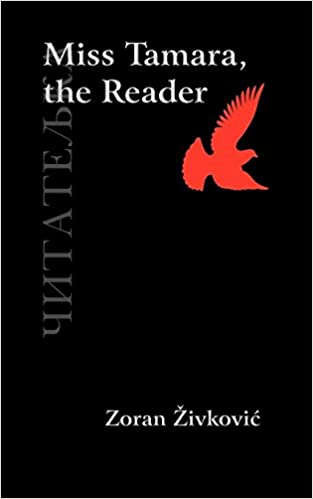 By ZORAN ZIVKOVIC (Kurodahan Press; 2006/10)
By ZORAN ZIVKOVIC (Kurodahan Press; 2006/10)
Zoran Zivkovic continues his love affair with the printed word (also evident in Zivkovic’s THE LIBRARY and THE LAST BOOK) in this beguiling collection. Like many of Zivkovic’s other books it’s extremely short, but, also like much of Zivkovic’s fiction, contains enough richness and inspiration to fill several mainstream novels.
It consists of eight stories, each featuring Miss Tamara, a compulsive reader, at a different period of her life. As in THE LIBRARY, the primary subject is books and their various supernatural properties, nearly all of which come to center on one thing: death. Here a new wrinkle is introduced in the form of fruit, which plays a pivotal part in each tale, starting with the titles.
In “Apples” Miss Tamara is eating apples while reading a book and becomes convinced she’s going to die, leading to some decidedly drastic actions. This effectively sets the tone and events of the following seven tales.
“Lemons” has Miss Tamara taking a strange job: reading a book to an eccentric young man, a book she learns is the newest work of a reclusive author—which, it transpires, is the author’s way of outwitting death (you’ll have to read the tale yourself to learn precisely how). Of a similar hue is “Bananas,” wherein Miss Tamara is lured to various locations—including, appropriately enough, a cemetery—by a series of postcards she finds in library books. “Gooseberries” sees Miss Tamara roped into reading a chapter of a book to a blind man in a park—with horrific consequences!
“Blackberries” tells of how Miss Tamara’s new reading glasses cause the words in her books to gradually disappear as she reads them. In the same vein is “Apricots,” which begins with Miss Tamara forgetting which fruit she ate while reading; this somehow causes her to forget everything she’s ever read.
There’s also “Melons,” in which Miss Tamara becomes obsessed with deciding the last book she’ll read before she dies, a query that turns out to be far more pertinent than she knows. The final story is “Fruit Salad,” which ties the previous seven entries together in fitfully cockeyed fashion, with Miss Tamara directed to the “Fruit Salad” café by an anonymous letter, with profoundly odd yet revelatory results…
